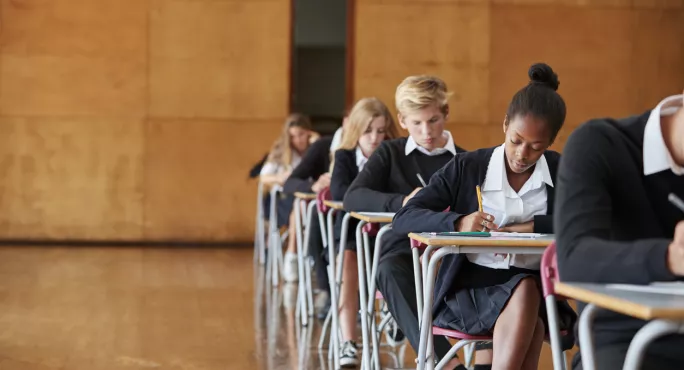
- Home
- Teaching & Learning
- Secondary
- Grading this year has been ‘a bit of a train wreck’
Grading this year has been ‘a bit of a train wreck’

A group of teenage students have called for the way they are assessed in senior secondary to be overhauled.
The call follows the review of Curriculum for Excellence published in June which highlighted the “misalignment between CfE’s aspirations and the qualification system” in the senior phase of secondary and led to the government announcing plans to replace the Scottish Qualifications Authority (SQA).
However, the young people aged 11 to 17, who were taking part in a piece of research published today reflecting on Covid lockdowns and the return to school, were also quick to warn that if exams are scrapped what replaces them has to be better than the system they have been subjected to this year.
Background: OECD review paves way for qualifications overhaul
News: SQA to be replaced, education secretary reveals
Exclusive: Exam questions shared on TikTok ‘SQA black market’
Teacher’s view: ‘My students aren’t failing - the system is’
Pupil’s take: What it’s like to have your exams cancelled - twice
They said that following the cancellation of the exams, as a result of the coronavirus pandemic, there had been a lack of clarity on the evidence-gathering process which meant too much time had been spent gathering information that could not be used to support grades.
“This has been stressful and inefficient,” said the report, called #ScotYouthandCOVID2: Young People’s Participation Through Crisis.
One 15-year-old girl said: “Even though this year, and last year haven’t been ideal, the general idea of a continuous assessment model seems a fair method of assessment and one that could work really well, if it was properly organised.”
Another 15-year-old - who said the current system for assessing pupils was “outdated” - commented that assessment this year had been “a bit of a train wreck”.
She added, however, that she was still interested in “the potential of alternative exams” but with evidence collection implemented “in a better way in future years” with “less of a toll on mental health for young people”.
The young people - who made 34 “asks” in total - also called for it to be recognised that teachers had struggled during the pandemic and that they need to be supported too.
One 13-year-old girl said: “I think they [teachers] must be overwhelmed as well…there might be an issue where we need to understand what the teachers are going through too.”
They said they had found it “extremely difficult to learn without a teacher being there” and that in any future periods of remote learning “we need to find a way to have live video teaching available for everyone”.
They also said that schools and teachers needed to ensure workloads are not overwhelming; and made the case for the creation of school-based discussion groups that could feed into government plans, so that children and young people can be a key part of ongoing improvements.
The 25 “young consultants” involved in the report - from Glasgow, Aberdeen, Edinburgh, rural Falkirk and rural Stirling - worked together from March 2021.
Their asks cover the issues that affected them throughout the pandemic such as motivation and school, wellbeing, uncertainty, addressing inequalities, helping with transitions from primary to secondary, exam years and recovery from the pandemic. They also emphasised the need to act on local environmental issues and climate change.
The young consultants will now gather the views of children and young people from across Scotland, focusing on listening to those who feel least heard over the pandemic. The aim is to create a Scotland-wide manifesto for change that represents the needs of as many children and young people as possible to ensure they are a key part of decision-making as the country moves out of the pandemic.
The report published today is by A Place in Childhood (APiC), supported by the Children and Young People’s Commissioner Scotland.
Children’s commissioner Bruce Adamson said that young people had the right to have their opinions heard in all decisions affecting them but “that has not happened enough during this pandemic”.
He added: “Understanding their experiences and insights and, crucially, their important ideas for change is vital to ensure the government lives up to its promise to respect, protect and fulfil children’s rights during and beyond the current crisis.”
You need a Tes subscription to read this article
Subscribe now to read this article and get other subscriber-only content:
- Unlimited access to all Tes magazine content
- Exclusive subscriber-only stories
- Award-winning email newsletters
- Unlimited access to all Tes magazine content
- Exclusive subscriber-only stories
- Award-winning email newsletters
You need a subscription to read this article
Subscribe now to read this article and get other subscriber-only content, including:
- Unlimited access to all Tes magazine content
- Exclusive subscriber-only stories
- Award-winning email newsletters
- Unlimited access to all Tes magazine content
- Exclusive subscriber-only stories
- Award-winning email newsletters
topics in this article



